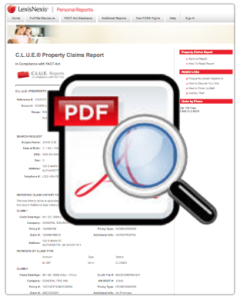Before You Buy, Easily Check The History Of Your Home With CLUE!

It’s always a good idea to check into the history of the home before closing on any house. Use CLUE to review claim information before you buy your next house.
Shopping for a new home is always a challenge and fraught with pitfalls. While the house may look perfect on paper there can be major expenses lurking in the walls or mechanicals. It’s always a good idea to check into the history of the home before closing on any house.
Luckily there is a tool that will check into insurance claims and losses on a property going back seven years, best of all it’s free. Most homeowner insurance companies submit claim information to a database named the Comprehensive Loss Underwriting Exchange, it is more commonly called the CLUE database.
What is CLUE?
Insurance companies submit claim information to this database. Insurers then use the database to verify claim details and make sure a homeowner is not submitting the same type of claim to several insurance companies. It is also used to verity that a homeowner applying for a new policy has not failed to disclose a prior claim or condition on the home they are trying to get insured. Basically the CLUE database is used to help insurers combat fraud.
This same database can be used by homebuyers to help determine if any home they are considering has had any damage or claims filed in the last seven years as well as how costly it may be to get a homeowners insurance policy on the potential property.
While the CLUE database has been around for a number of years, most homebuyers and homeowners are unaware of this tool and how it can help them. According to a recent survey done by InsuranceQuotes.com, over 82 percent of those surveyed had no idea what CLUE was or how a to get a CLUE report.
What is Included in a CLUE report?
A CLUE report includes the following data:
- Insurance company name
- Policy number
- Claim number
- Claim dates
- Type of loss
- Amount paid for claim
- Any denied claims will also be listed
While the type of claim will be listed in the report, it will not indicate which part of the home was affected and resulted in a claim. You will need to get those details from the current homeowner.
It’s also possible that a CLUE report will come back blank. This is possible if the homeowner has not made any claims in the past seven years or if their particular insurance company does not participate in the CLUE database.
It is also important to remember that a CLUE report will not include information for previous owners of the home, which means if damage occurred to the house prior to the current owner that information will not be on the report.
How Can I Get a Clue Report?
It is possible to get one free clue report per year from the database company LexisNexis. These reports can be obtained online or you can call (866) 312-8076 to request a free report.
The one big caveat is that only the current homeowner can request the report, which means that the current owner of the house you are considering must request the report and pass it on to you.
Realtors and industry experts recommend that home sellers obtain a CLUE report before putting their home on the market so that is available to potential homebuyers.
Part of the due diligence when considering a specific home is asking the homeowner to provide you with a CLUE report. If they refuse or are reluctant to obtain this report, this should be considered a red flag and you may want to move on to a different home.
How to Use a CLUE Report
Once you have a copy of the CLUE report you should give it a thorough reading looking for any claims that could lead to future problems or make the home expensive to insure. These could include burglaries, water damage or even past fires at the home or property.
As an example, if there are multiple burglary claims on the report, inspect to pay more for homeowners insurance and it also could indicate that the home should be outfitted with a proper alarm system.
Examine the report looking for claims such as flood damage, this can indicate the home is located in a floodplain which will push up the cost of homeowners insurance. Any water damage or other major claims should be investigated. It is important to verify that repairs have been made and done properly.
The report can also bring good news. As an example, a damaged roof that was recently replaced means that you will not be on the hook for new roof anytime soon and you may be able to get a discount on your homeowners insurance policy if wind-resistant materials were used.
A CLUE Report is Not Definitive
It’s important to remember that a CLUE report is only one component of your due diligence when considering a home. It is not an inspection and only covers issues where a claim on an insurance policy has been made.
You should absolutely have a separate home inspection done and notify the inspector of any repairs that came up on the CLUE report so they can verify repairs were done correctly.
Home sellers are required to disclose any known problems with the home on the disclosure form which should also be examined thoroughly and any known issues should be investigated.

